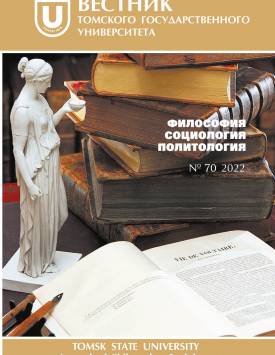Parallelism of semantic theories in analytic philosophy and theories of terminological planning
Trends in the development of semantic theories of analytic philosophy and of theories of terminological planning are investigated. Addressing this issue is due to the need to identify the direction of the development of the semantic aspects of the language in the logical-cognitive, linguistic and social aspects on the example of theories of analytic philosophy and theories of terminological planning. The main lines of research on the semantic aspects of the language were associated with the areas of logic and linguistics, while the social factor was considered to a lesser extent. Turning to the sphere of terminology actualizes this aspect, since it is the need of society (societies) for integration that leads to the need to create this science. The development of theories of terminology (terminological planning) from the 1930s up to the present time reveals a certain parallelism in the definition of the meaning of a term in theories of terminology in relation to the meaning of a concept (word, linguistic expression) in theories of analytic philosophy. This parallelism in the definition of meaning conventionally lies in the fact that the initial theories of analytic philosophy (Gottlob Frege, Bertrand Russell, Ludwig Wittgenstein (in the Logical-Philosophical Treatise period)) and the theory of terminological planning (the general theory of terminology by Eugen Wuster, the extended theory of terminology by Helmut Felber) are characterized by a prescriptive setting in relation to the parameters of establishing meaning for a concept (linguistic expression) and a term. The prescriptive setting of these theories is that in them the researcher prescribes the parameters that must be present in the meaning of a word (concept, term, linguistic expression), which, according to the authors, indicates a social factor of influence on the semantic process. Similar parallels are observed in the semantic theories of analytic philosophy and in theories of terminological development at further stages of their development, when it turns out that the prescriptive character acts as a requirement that cannot be met in the process of determining the meaning of a word (concept, term, linguistic expression). In this connection, in the theories of analytic philosophy (Wittgenstein in the Philosophical Studies period, Saul Kripke’s theory of rigid designators) and in the theories of terminological planning (Maria T eresa Cabre’s theory of doors), a descriptive approach begins to be applied. It consists in the fact that the meaning of a word (concept, term, linguistic expression) cannot be preset, but is established in the process of its application (at the very moment of use). In this case, the social factor of influence on the semantic process begins to be less controllable than in the case of its functioning as a prescriptive setting. The authors declare no conflicts of interests.
Keywords
semantic parallelism, theories of analytic philosophy, theories of terminological planning, prescriptive attitude, descriptive attitude, social aspectAuthors
| Name | Organization | |
| Ardashkin Igor B. | Tomsk Polytechnic University; Tomsk State University | ibardashkin@tpu.ru |
| Surovtsev Valery A. | Tomsk Scientific Center, Siberian Branch of the Russian Academy of Sciences; Tomsk State University | surovtsev1964@mail.ru |
References

Parallelism of semantic theories in analytic philosophy and theories of terminological planning | Tomsk State University Journal of Philosophy, Sociology and Political Science. 2022. № 70. DOI: 10.17223/1998863X/70/1
